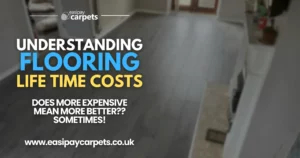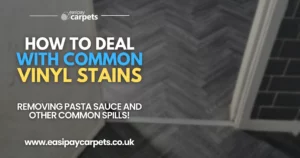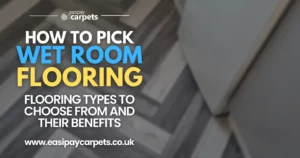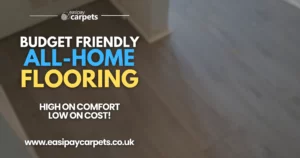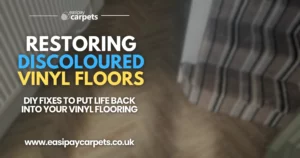

Can You Install Vinyl Flooring Outside?
Hello, lovely readers! Today, we’re exploring a question that many of us have probably pondered at some point: Can you use vinyl flooring outside? Vinyl flooring, with its durability and aesthetic appeal, is a fantastic choice for indoor spaces, but what about outdoor areas? Whether you’re considering sheet vinyl or self-adhesive luxury vinyl tile (LVT), we’re here to give you the lowdown. Let’s dive in!
Understanding Vinyl Flooring
What is Vinyl Flooring?
Vinyl flooring is a versatile and popular flooring option known for its:
- Durability: It can withstand heavy foot traffic and resist scratches and stains.
- Affordability: It offers a cost-effective alternative to more expensive flooring materials.
- Aesthetic Variety: Available in numerous styles, colours, and patterns, vinyl can mimic the look of wood, stone, and other high-end materials.
Types of Vinyl Flooring
There are two main types of vinyl flooring to consider:
- Sheet Vinyl: Comes in large, continuous sheets and is often used in areas that require waterproof flooring.
- Self-Adhesive Luxury Vinyl Tile (LVT): Comes in tiles or planks with a self-adhesive backing, making it easy to install and ideal for DIY projects.
Can You Use Vinyl Flooring Outside?
The Challenges of Using Vinyl Flooring Outdoors
While vinyl flooring is highly durable indoors, using it outdoors presents several challenges:
- Weather Exposure: Outdoor environments expose flooring to extreme weather conditions, including UV rays, rain, snow, and temperature fluctuations, which can cause damage.
- Moisture Issues: Excessive moisture from rain or humidity can cause vinyl to warp, peel, or develop mould and mildew.
- Temperature Fluctuations: Vinyl flooring can expand and contract with temperature changes, leading to potential cracking or loosening of tiles.
Sheet Vinyl Outdoors
Pros:
- Water Resistance: Sheet vinyl is highly water-resistant, which can be beneficial in damp environments.
- Ease of Cleaning: It’s easy to clean and maintain, making it suitable for covered outdoor areas like patios or porches.
Cons:
- Susceptibility to UV Damage: Prolonged exposure to sunlight can cause sheet vinyl to fade and become brittle.
- Installation Challenges: Proper installation is crucial to prevent water from seeping underneath, which can be difficult to achieve outdoors.
Best Practices:
- Use in Covered Areas: Consider using sheet vinyl in covered outdoor spaces that are protected from direct sunlight and heavy rain.
- Seal the Edges: Ensure all edges are properly sealed to prevent water infiltration.
- Regular Maintenance: Clean regularly and inspect for signs of damage or wear.
Self-Adhesive Luxury Vinyl Tile (LVT) Outdoors
Pros:
- Easy Installation: The self-adhesive backing makes LVT easy to install, even for DIY enthusiasts.
- Stylish Options: LVT offers a wide variety of styles, allowing you to create a chic outdoor space.
Cons:
- Adhesive Issues: The adhesive can weaken in high humidity or extreme temperatures, causing tiles to lift.
- Durability Concerns: While LVT is durable indoors, it may not hold up as well under constant exposure to the elements.
Best Practices:
- Use in Enclosed Spaces: LVT is best used in enclosed or semi-enclosed outdoor areas like screened porches or sunrooms.
- Temperature Control: Avoid using LVT in areas that experience extreme temperature fluctuations.
- Proper Preparation: Ensure the surface is clean, dry, and level before installation to maximize adhesion.
Alternative Outdoor Flooring Options
If vinyl flooring seems too risky for your outdoor space, consider these alternative options:
1. Porcelain or Ceramic Tiles
- Pros: Highly durable, weather-resistant, and available in various styles.
- Cons: Can be slippery when wet and may require more intensive installation.
2. Composite Decking
- Pros: Designed specifically for outdoor use, resistant to moisture, and low maintenance.
- Cons: Can be more expensive than other options.
3. Natural Stone
- Pros: Extremely durable and aesthetically pleasing.
- Cons: Can be costly and require professional installation.
4. Concrete
- Pros: Very durable and customizable with staining or stamping.
- Cons: Can crack over time and may need sealing.
Maintaining Outdoor Flooring
Regardless of the type of flooring you choose, proper maintenance is key to ensuring longevity:
- Regular Cleaning: Sweep and clean regularly to remove debris and prevent staining.
- Protective Measures: Use mats or rugs in high-traffic areas to protect the flooring.
- Inspect for Damage: Regularly inspect for signs of wear, damage, or mould and address issues promptly.
Easipay Carpets can help you get brand new flooring without the high up-front cost – by simply letting you spread the cost of the flooring over time instead. There’s no interest on our plans so you aren’t spending a penny more than you would buying it outright and we include underlay, door trims, carpet grippers and laminate beading for free. Prices start from just £10 per week!
It starts with a free home appointment and quote, to get booked in at a time that suits you, tap the “Get Started” button below and fill out the contact form!

